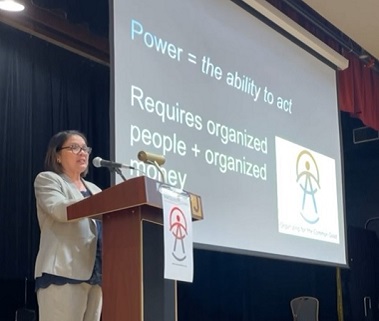
Maria Fe Infante co-chaired the MVA gathering. Image from video
Metro Vancouver Alliance (MVA) is back. A lively assemblage of delegates representing a wide range of groups gathered at the Jewish Community Centre Sunday afternoon (April 23), making it clear they are keen to get active again.
Maria Fe Infante introduced the evening as one of two co-hosts. Introducing herself as a member of St. Mary’s Catholic Parish, she welcomed delegates and set the stage:
We are gathered today to reclaim power for our alliance. MVA is a broad-based alliance of community, faith and labour organizations. Our organizations represent workers, worshipers, volunteers, the everyday rank and file and lay leaders who build lives in our cities and want to make them into places we can thrive.
We have different traditions, beliefs and priorities, yet we share a belief that ordinary residents have a central role to play in shaping the decisions that impact each and every one of us.
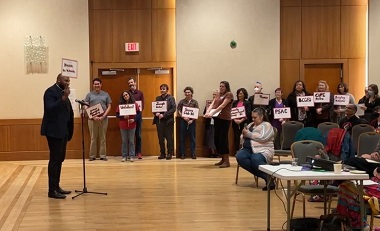
Delegates, including Rev. Tellison Glover from the Anglican Diocese of New Westminster, pledged membership and financial support for MVA. Image from video
Infante, a long-time member of the Hospital Employees’ Union, then pointed out that MVA is not just about creating good will and cultivating pious hopes:
We also know that it takes real power to make change. Too often, our members do not have the recognition it takes to be taken seriously in the public arena. We know that we have to come together to build power so that we can claim our rightful place at decision-making tables.
Today we are going to look at two ways that we build power. The first is organized people. Together we will relaunch the public organizing work of MVA. We will call on you to participate in this work. We are not an organization that does things for people; we do things with each other.
The power we will have moving forward will depend on your participation. Today you will be asked whether you think you think this work is important enough to take part.
The second way of building power, according to the other co-chair, Sarah Bjorknas, President of CUPE Metro Vancouver District Council, “is through organized money.”
Judging by the enthusiastic response during the evening, and the announcement of financial support from members, it appears that MVA is back on its feet.
One highlight was the announcement of financial support from members, with delegates taking turns going to the mike and announcing their membership contribution. The minimum fee is meant to be $1,000, but many groups offered much more. One union gave $10,000 another $20,000, and many of the small religious groups gave well above the minimum.
Early wins, hiatus
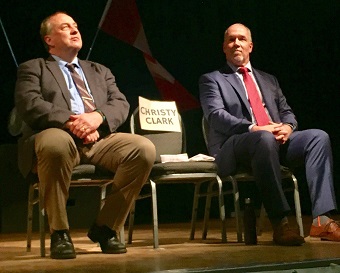
All three of the key provincial leaders were invited to the MVA’s Provincial Accountability Assembly in 2017. Two came.
MVA started strong almost a decade ago.
A couple of highlights were the Municipal Accountability Assembly during the lead-up to the 2014 municipal elections and the Provincial Election Accountability Assembly in 2017. Each drew hundreds of delegates and supporters to the Italian Cultural Centre.
The former featured incumbent Vancouver Mayor Gregor Robertson on stage, along with two other candidates (Kirk LaPointe and Meena Wong).
They all committed to a living wage for city employees; Robertson then followed through on that promise. (The current municipal government has just rolled back that commitment.)
The latter drew Premier John Horgan and Green Party leader Andrew Weaver. Liberal Leader Christy Clark did not show up, a point that was not lost on any of the participants because an empty chair with her name on it was placed between the other two leaders.
At the recent MVA gathering, Paul Clark, an entrepreneur and member of St. Catherine’s Anglican Church on the North Shore, pointed to those high points, and others, before asking what happened to MVA.
He pointed to four key reasons for its inactivity over the past few years:
- Many issues, spread too thin
- Leadership turnover
- Loss of focus on membership engagement and leadership development
- COVID-19 pandemic
Why get involved?
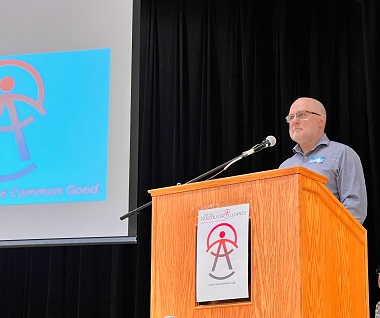
Tim Dickau explained why he believes MVA plays such a unique role. Photo: Amanda Mina
Tim Dickau, Director of CityGate Vancouver, spoke after Clark:
I am here to give you a little narrative of what has happened over the past year or so at MVA.
While the church I pastored for 30 years, Grandview Church, was involved in MVA for many years, I only got personally involved a year ago, and it was after seeing the hard work that people like Paul [and others] have been putting in to keep MVA going through those challenging years.
Mostly why I got involved, though, is because CityGate’s aim is to foster collaboration between faith communities and the rest of the city – to work for the good of the city.
When I looked around in my new role, it became increasingly clear and obvious to me that there was no other broad-based organizing group like MVA that is pulling people together to share the concerns of its members and of the most vulnerable in our city.
I’m also committed because it’s so clear that we are living in a society that is increasingly polarized around so many issues.
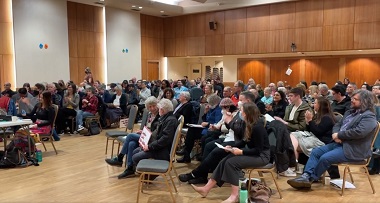
Some of the MVA assembly. Image from video
MVA gets people around the table to talk, to get to know one another, to find areas of common concern that we can work together to build trust and power.
You know, if you’ve done organizing, this is really hard work – but it’s my experience of leading diverse groups that it’s the only way to transform our cities for the long term. And the gift is that we are enriched by the relationships we build along the way. . . .
I believe in what MVA has already accomplished and I believe we can accomplish significant change once again. The fact that we have identified housing as a key area that we want to work on as an organization only adds fuel to my fire.
The church I pastored developed three projects around housing – one for low-income residents, one for refugee claimants, plus a number of community houses for those in vulnerable situations. Like so many of you, I have so many stories of people who are just in crisis because they can’t find lasting housing. . . .
New leader, renewal
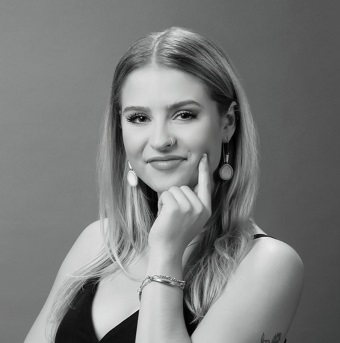
Lucy Everett is MVA’s new Project Organizer.
One of the key purposes of this meeting was to officially introduce the Project Organizer, Lucy Everett, who has been preparing for the assembly since she joined MVA last fall, mainly by engaging with current, former and prospective member organizations, “focusing on relationship-building and listening.”
She said:
We are very excited that today we are officially relaunching the public organizing work of MVA!
There is a lot of enthusiasm for many different issues in this alliance, and that leads to a strong pull to spread ourselves thin. But we want to encourage ourselves to start by choosing one thing and doing it well. . . .
And so today [following a March 5 meeting of representatives from 25 organizations], we’re asking you to join us as we launch an organizing campaign with a focus on housing affordability.
Because MVA wants to focus on member engagement – without which activists become disengaged from their faith, union or other communities – four training sessions are planned:
- Listening Campaign (May 4)
- Foundations of Community Organizing (June 16 – 17)
- Research Action Team (September 6)
- Wrestling with the Truth of Colonization (September 19 – October 3)
Videos of the April 23 assembly can be seen on the MVA Facebook page.

About 10 years ago I attended an MVA meeting in Vancouver that introduced what the new organization was seeking to achieve, and by what means. That event reminded me how, about 40 years earlier, I was part of a group trying to deal with similar issues.
Together we read The United Front (1938) by Georgi Dimitrov. Out of that reading and discussion I distilled some practical perspective that I have never forgotten. Fifty years is a long time ago, but sometimes it seems like just yesterday.
As an Anglican clergy person, I’ve been a strong supporter of MVA from its beginning, working with the Anglican group before I moved to the Sunshine Coast. The coalition of faith groups, unions and community organizations has been very effective and will continue to do good work.
My involvement as a member of a faith community provided an opportunity to work with members of Lutheran, United Church, Baptist, Sikh, Roman Catholic and Jewish communities. That in itself, was an enriching experience.